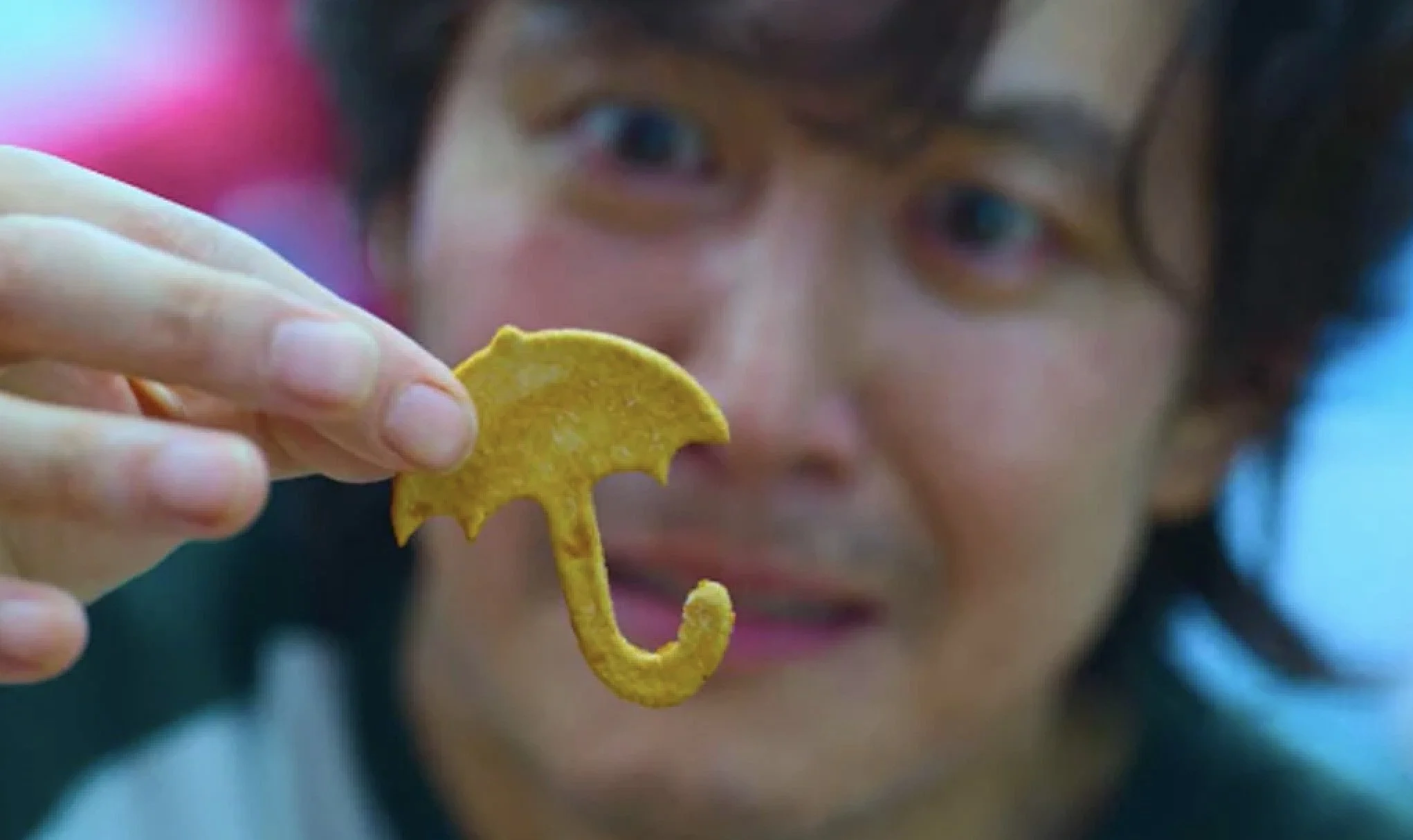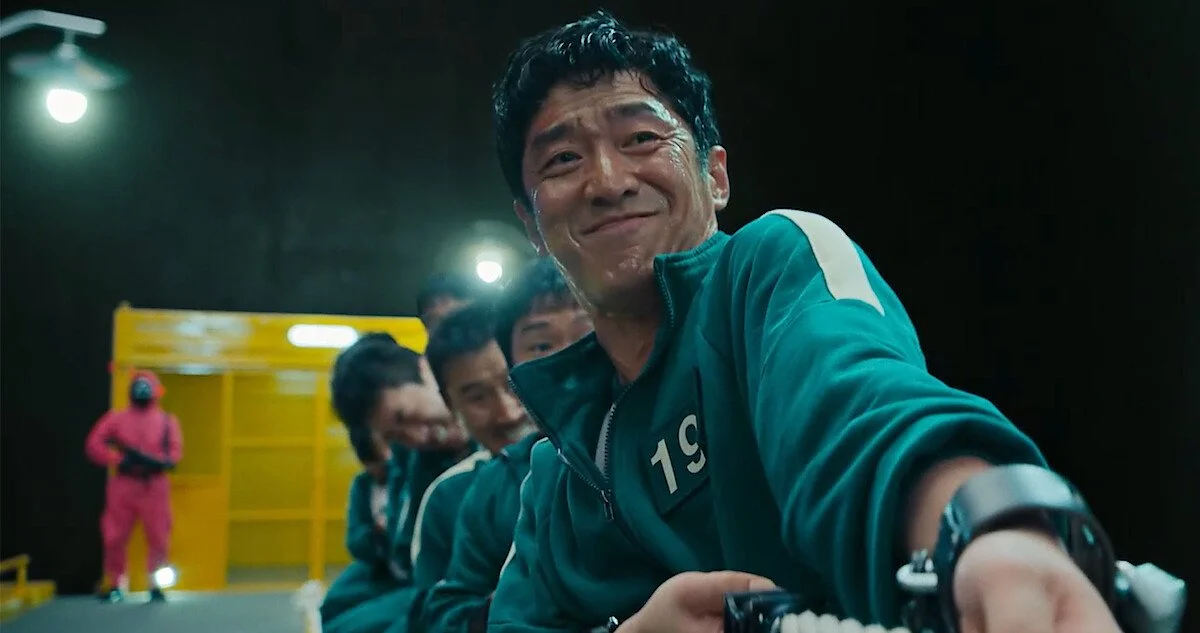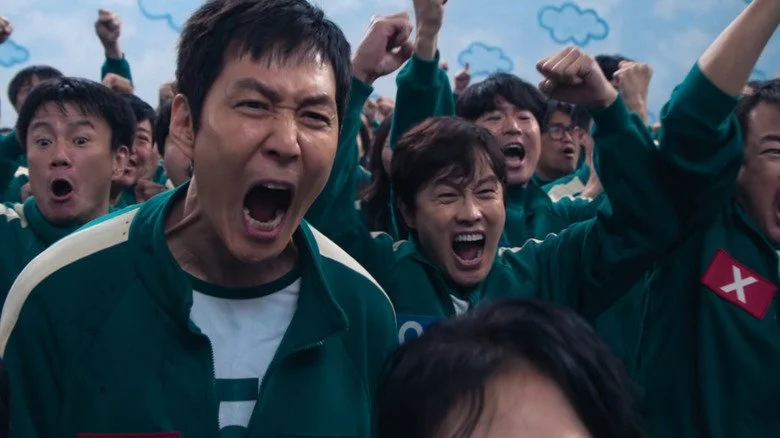Red Light, Green Light, Squid Game Life Lessons
I just watched season 3 of Squid Game, and it got me thinking: what if we could harness the raw intensity of those neon-lit death matches for something slightly less murderous? Check this: it's 6 AM, your alarm screams like a playground whistle, and you're suddenly sprinting across the trembling glass bridge of Monday morning. Your coffee mug wobbles precariously as masked sentinels (a.k.a. your responsibilities) watch from every corner, ready to eliminate you for one wrong step.
Here's the twist that'll blow your mind: in real life, you're simultaneously the desperate Player racing toward your goals AND the no-nonsense Guard enforcing the protective systems that keep you sane. One moment, you're lunging forward with reckless ambition; the next, you're pulling back with the discipline of a pink-suited enforcer, saying "absolutely not" to that third work commitment.
Welcome to the ultimate survival guide where sugar-honeycomb precision meets boundary-setting badassery. I'm about to serve you eight razor-sharp game lessons that'll help you outmaneuver stress with wit and resilience and maybe keep your sanity intact. No green tracksuits are required, but a sense of humor is mandatory.
Red Light, Green Light → Mindful Pause & Self-Regulation
Remember that giant creepy doll with the dead-eyed stare? She's basically your impulse control wearing pigtails. The game's brutal lesson? Movement without awareness equals elimination.
Player Mode: Stop treating your inbox like a zombie apocalypse, where every email demands immediate life-or-death responses. Learn to halt the knee-jerk "reply all" disaster or the 2 AM phone scroll spiral that leaves you more wired than a contestant on day three, when you feel that familiar surge of reactive energy, freeze. Ask yourself: "Am I moving toward my goal, or am I just moving?"
Guard Mode: Develop a "pause alarm" habit by taking three deep breaths before any major action. Install this internal security system: when someone dumps an "urgent" task on your desk, when your teenager tests boundaries, or when your partner leaves dishes in the sink for the fifth time. Your Guard self counts to three, breathes, and then responds instead of reacting.
Try This Now: Set three random phone alarms today. When they go off, freeze everything you're doing for ten seconds. Notice what you were rushing toward and whether it actually mattered.
Dalgona Challenge → Focused Patience & Precision Systems
That sugar-honeycomb nightmare taught us that sometimes the gentlest pressure wins. No frantic stabbing, no shortcuts, just steady, focused effort that would make a surgeon jealous.
Player Mode: Tackle your day's to-do avalanche one micro-task at a time. Instead of attacking your entire project like you're trying to carve an umbrella in thirty seconds, break it down into manageable pieces. Email draft: five minutes. Research: fifteen minutes. Resisting the urge to check Instagram is priceless.
Guard Mode: Create simple rituals that train your brain to handle complexity calmly. Daily five-minute focus sprints become your non-negotiable boundary. When chaos erupts around you, your Guard self says, "Nope, we're doing this one careful step at a time."
Micro-Exercise: Choose one overwhelming task that you're currently facing. Set a timer for just five minutes and do only the first tiny piece. Watch how your brain stops screaming about impossibility and starts humming with possibility.
Tug-of-War → Collaborative Strength & Healthy Boundaries
The beauty of tug-of-war wasn't individual muscle. It was a synchronized strategy. The winning teams moved as one breathing organism, knowing exactly when to pull and when to anchor.
Player Mode: Rally your teammates on that impossible project deadline. Shared effort wins, but only when everyone's pulling in the same direction. Stop trying to be the lone wolf hero, dragging everyone else's weight. Ask for help, delegate smartly, and remember that even superheroes have sidekicks.
Guard Mode: Know when to say no, delegate, or step back entirely. Your Guard self recognizes that no one pulls alone forever without snapping. Set up systems that allow you to hand off the rope occasionally. Create backup plans for when your energy reserves hit empty.
Reality Check: Examine your most significant current challenge. Who else could grab part of this rope? What would happen if you actually asked for help instead of martyring yourself into exhaustion?
Marbles Match → Values Alignment & Integrity Structures.
The Marbles game wasn't about luck. It was about staying true to your core strategy even when everyone around you was losing their minds. The winners had clear rules they wouldn't break, even under pressure.
Player Mode: Choose tasks and relationships that mirror your core values. Stop saying yes to opportunities that look shiny but feel hollow. If family time matters, guard it like those precious marbles. If creativity fuels you, don't trade it for busy work that pays bills but kills your soul.
Guard Mode: Keep a "values scoreboard," a quick mental checklist before every big decision. Does this align with who I want to be? Will I respect myself tomorrow? Your Guard self becomes the referee, calling fouls when you're about to trade your integrity for short-term wins.
Quick Values Check: Name your top three non-negotiable values. Now, honestly assess: what percentage of your current commitments actually honor these values? Uncomfortable truth is incoming.
Glass Bridge → Calculated Risk-Taking & Safety Nets
The glass bridge was pure terror, but the smartest players didn't just pray and leap; they took calculated risks. They watched, learned from others' mistakes, and moved with calculated courage rather than blind faith.
Player Mode: Break daunting goals into small "tested steps" rather than blind leaps. Starting a business? Test your idea with five friends before quitting your day job. Want to change careers? Shadow someone for a day before diving into graduate school debt.
Guard Mode: Build fallback plans, financial, emotional, and logistical, that catch you if you slip. Your emergency fund becomes your safety net. Your support system becomes your backup bridge. Your Guard self insists on parachutes before cliff-jumping.
Safety Net Audit: List your three most significant current risks. What's your backup plan if none of these options work out? If you don't have solid answers, your Guard self is waving red flags.
Squid Tag → Assertive Yes/No Boundaries & Delegation Rules
In the squid tag, you either defend your territory or get eliminated; there's no middle ground, no wishy-washy half-measures. The game demanded clear, firm boundaries with immediate consequences.
Player Mode: Stand your ground with confidence. "You can't assign me that extra task right now. I'm at capacity." "I can't stay late tonight. I have commitments." Your Player self pushes forward toward goals, but not at the expense of being trampled.
Guard Mode: Draft a personal "yes/no" script for interruptions. Protect your focus zone like a pink-suited enforcer. "I can help you with this tomorrow between 2-3 PM." "I'm not available for calls after 8 PM." Your Guard self doesn't negotiate with boundary-pushers.
Boundary Bootcamp: Practice saying "no" to three small requests today. Notice how the world doesn't come to an end. Notice how your energy stays more intact.
Secret Alliances → Trustworthy Partnerships & Transparent Systems
The most successful players built genuine alliances based on mutual respect and shared goals. The sneaky backstabbers? They got eliminated fast once people caught on to their games.
Player Mode: Form genuine collaborations with mutual honesty over hidden agendas. Be the person others can count on, and surround yourself with people who do the same. Your reputation becomes your most valuable game piece.
Guard Mode: Set up shared calendars, check-in rituals, and open feedback loops that keep everyone accountable. Your Guard self insists on transparency, no hidden resentments, no passive-aggressive power plays, and no "everything's fine" when it's clearly not.
Trust Inventory: Assess Your Current Relationships. Who has your back when the pressure hits? Who drains your energy with drama? Your Guard self needs to know the difference.
Final Race → Short Sprints & Sustainable Routines
The final showdown wasn't about constant intensity. It was about knowing when to sprint and when to pace yourself. The winners alternated between explosive effort and strategic rest.
Player Mode: Use high-intensity bursts (Pomodoro sessions, focused work blocks) to power through urgent tasks. When deadlines loom, sprint like your life depends on it. But then...
Guard Mode: Balance with sustainable daily routines, sleep, movement, and meals that fuel long-term performance. Your Guard self enforces recovery time, knowing that burned-out players get eliminated not by external forces but by their own exhaustion.
Sprint/Rest Rhythm: Try the 25-minute focused work sprint, followed by a 5-minute complete break. Repeat three times, then take a longer 30-minute break. Notice how your energy actually increases instead of depleting.
The Ultimate Game Strategy
Here's what those neon-lit death matches taught us: winning your everyday means knowing when to sprint toward your dreams and when to safeguard your well-being. You need both the Player's relentless forward momentum and the Guard's protective systems. The Players who survive aren't the ones who never pause. They're the ones who pause strategically.
Your life isn't a survival game where only one person wins. It's a complex dance where your Player and Guard selves work together, taking turns leading. Sometimes, you need to push boundaries; sometimes, you need to enforce them. Sometimes, you need to take calculated risks; sometimes, you need to step back and build stronger safety nets.
The real victory isn't about eliminating everyone else; it's about achieving a better understanding. It's about creating systems that let you thrive sustainably, build genuine connections, and sleep well at night, knowing you're aligned with your values.
Remember: the best Squid Game life lessons aren't just about surviving; they're about thriving. Now, go win your everyday, one strategic move at a time.
By Sypharany.









